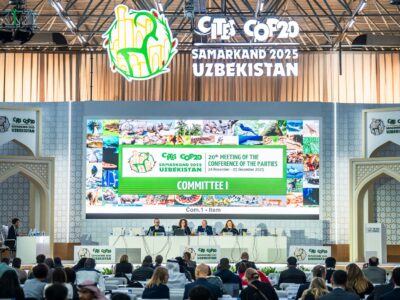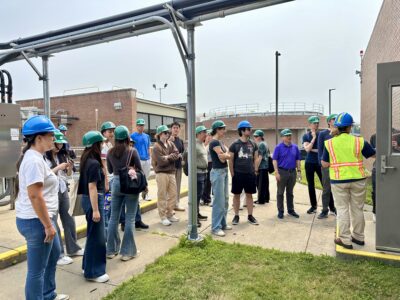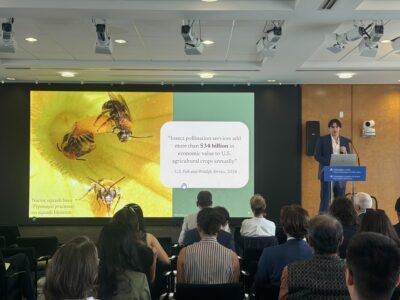
On November 14, one day before America Recycles Day, members of the MPA in Environmental Science and Policy (MPA-ESP) class of 2014 conducted a waste audit in SIPA’s 4th floor “fishbowl,” the most visible and heavily used area of the School of International and Public Affairs (SIPA). The audit was hosted by the SIPA Sustainability Committee, of which many ESP students are a part.
Clad in full-body Tyvek suits and rubber gloves, the students sought not only to measure and analyze the waste stream of the International Affairs Building, but also to demonstrate to SIPA students, faculty, and visitors the amount of recyclable material thrown improperly into the fishbowl’s trash cans. The Sustainability Committee decided the best visual of this was to literally empty bags of trash in front of passersby, and sort out recyclables by hand.
The Committee removed a total of:
-10 pounds of plastics/aluminum/glass
-6 pounds of paper
-17 pounds of food waste
The Greenmarket on 115th and Broadway happened to be open that day (every Thursday and Sunday!) so the Committee was able to drop off food scraps to the GrowNYC compost drop-off booth rather than throwing it back in the trash.
Shown here are the before and after weights of the 5 bags analyzed.
| Weight of trash bags before separation | Weight of trash bags after separation | Percentage that could have been recycled or composted: |
| 19 lbs | 8 lbs | 58% |
| 10 lbs | 3lbs | 70% |
| 12 lbs | 3 lbs | 75% |
| 11 lbs | 2 lbs | 82% |
| 12 lbs | 3 lbs | 75% |
“It’s incredible to see how much of this material could have been kept out of these trash bags, especially if you include the food waste,” said current MPA-ESP student and member of the SIPA Sustainability Committee Benjamin Salley. “A large amount of recyclables are ending up in the wrong bins and a lot of food is being thrown out, which is unfortunate when you consider how many people are in need.”
 The significant difference in the weight of the trash bags before and after sorting made it clear that awareness of what you can recycle and why you should needs drastic improvement. The volume of recyclables coming from offices suggests that faculty need clearer messages on recycling policies and that Columbia in general may need broader institutional improvements to reduce waste.
The significant difference in the weight of the trash bags before and after sorting made it clear that awareness of what you can recycle and why you should needs drastic improvement. The volume of recyclables coming from offices suggests that faculty need clearer messages on recycling policies and that Columbia in general may need broader institutional improvements to reduce waste.
“The recycling receptacles are quite misleading. They only say ‘bottles and cans,’ so a lot of people don’t realize that you can recycle all plastics, aluminum, and glass,” stated Asha Kreiling, another MPA-ESP student member of the SIPA Sustainability Committee. “Even though we spend most of our time at school learning about environmental issues and solutions, we often forget about the little things in our daily lives – the salad bowl, the disposable coffee cup, the food waste – really adds up and has a big impact on the environment.”
While disheartening, the results of the audit have prompted the Sustainability Committee to work even harder to educate students and faculty with better signage on waste and recycling receptacles, outreach, and more waste audits. The Committee is hopeful that their first audit will help students and staff to remember to recycle and reduce waste, and even serve as an impetus for broader institutional change.
Students in the MPA in Environmental Science and Policy program enroll in a year-long, 54-credit program offered at Columbia University’s School of International and Public Affairs, in partnership with the Earth Institute. Throughout this one-year program, students are immersed in courses that combine Columbia University’s hands-on approach to teaching public policy and administration with pioneering thinking about the environment. During the summer semester, students learn the fundamentals of environmental science, while in the fall and spring semesters, they focus on the policy and economics necessary to becoming successful environmental analysts and managers. Visit our website to learn more about the program.



